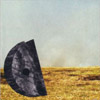Zoviet France, "Shouting at the Ground"
 Despite being one of the most compelling entities to emerge from England’s fertile ‘80s post-industrial scene, Zoviet France remain a largely unheard and somewhat mythical band. Obviously, the main reason for their relative marginalization is that their albums (aside from a few late period ambient works) have historically been quite hard to track down. I suspect that was true even during their prime, as I am certain that I would have bought an album packaged in a canvas sack or between roofing shingles if it had appeared in one of the record stores I frequented as a teen (regardless of who it was by). Thankfully, the magic of the Internet has rescued this lost classic from the cruel fate of vanishing without ever being properly appreciated.
Despite being one of the most compelling entities to emerge from England’s fertile ‘80s post-industrial scene, Zoviet France remain a largely unheard and somewhat mythical band. Obviously, the main reason for their relative marginalization is that their albums (aside from a few late period ambient works) have historically been quite hard to track down. I suspect that was true even during their prime, as I am certain that I would have bought an album packaged in a canvas sack or between roofing shingles if it had appeared in one of the record stores I frequented as a teen (regardless of who it was by). Thankfully, the magic of the Internet has rescued this lost classic from the cruel fate of vanishing without ever being properly appreciated.
Red Rhino/Charrm
Due to the shadowy and elusive nature of their releases, it takes some serious effort to acquire a complete understanding of how Zoviet France’s sound evolved over the years. Hearing one ZF album does not necessarily provide a reliable estimate of what another one might sound like, as the band went through a number of significant personnel and stylistic changes over the course of their two active decades. 1988’s Shouting at the Ground, however, has managed to emerge by general consensus as as one of the clear highlights in their sprawling and disorienting discography. The reasons for that are self-evident upon hearing it, but it is also significant for being the most listenable nexus at which ZF’s forays into ambient, harsh tape loop collages, and neo-tribalism converged. This particular vein never got pursued as far as it deserved, sadly, as the remainder of ZF’s career is strewn with live albums, compilation albums, deleted albums, long hiatuses, and one-off experiments (like deconstructing Ry Cooder).
The bulk of Shouting at the Ground is composed of very brief sound experiments that often run under two minutes. Rather than feeling like a bunch of prematurely abandoned song sketches, however, they unfold like series of otherworldly, self-contained miniatures. To say they are eclectic would be a gross understatement, as they range from breathy primitive flutes to Eastern strings to dense, insistently repeating tape loop pile-ups. The only conspicuous unifying features are that they are invariably grittily lo-fi and a little bit ominous. Some of them can get quite harsh (“Dybbuk” makes me feel like I am being attacked by swarm of vampire bats), but most are meditative or at least hypnotically repetitive. One notable aspect about the hallucinatory and unfamiliar menagerie of sounds gathered is that the vast majority of Zoviet France’s material originated from live instrumentation. The semi-anonymous, ever-shifting cabal of contributors amassed quite an array of ethnic and homemade instruments over the years and recorded untold hours of ideas and improvisations with them (the key to ZF’s unusually organic sound). All those tapes were then sifted through, manipulated, and painstakingly shaped into often wildly different form before ultimately appearing on an album. The amount of time that it must have required to edit and tweak that mountain of raw material without a computer seems almost impossibly daunting and makes my brain hurt.
Listening to the album is disconcertingly analogous to a surreal walk down a long, dimly lit hallway: exotic instrumentation and weird, inhuman loops drift in and out of the aural landscape- just fleeting, disconnected snatches of mysterious soundworlds lurking behind closed doors. The reason that this image feels so apt is that the end of the album feels like a destination has been reached: “Shamany Enfluence” and “The Death of Trees” both unfold into epic, immersive, and evolving vistas. To further belabor my inadequate visualization: a pair of doors finally open and unveil their complete and unsettling contents.
The distorted alien chanting of “The Death of Trees” is pretty engaging simply because it sounds creepily and utterly unearthly, but “Shamany Enfluence” is the album’s clear centerpiece (and masterpiece). Describing it as “ethno-ambient” provides a vague idea of how it sounds, but it is a thoroughly simplistic and misleading one. At its best, it sounds more accurately like a decaying transmission of a forgotten tribe’s mourning ceremony (accompanied by a chorus of psychedelic frogs). It is at once eerily beautiful and wholly “other” and would have made the perfect end to the album. Instead, the aforementioned “The Death of Trees” follows for a necessarily anticlimactic conclusion, but I can’t fault the band for its placement: it was too good to leave off and it wouldn’t have fit anywhere else. From start to finish, this is inarguably one of the most strange and visionary albums to emerge from 1980’s England—no small feat, given the competition. Shouting at the Ground is the sound of a band straining their ingenuity and creativity to the limit in hopes of forging something stunning and unique (and succeeding).
(Aside: While I was researching this album, I found an Italian language history of Zoviet France and unsuccessfully attempted to translate it using Babelfish. "Album" translated as "egg white" and I learned that their sound is based primarily upon "monoropes.")
Samples:



